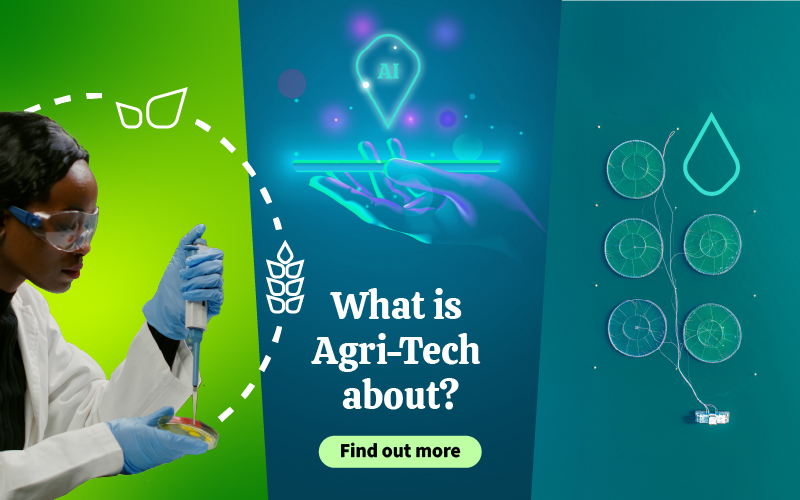Outside of the sector, agriculture is often still perceived as using traditional or old-fashioned methods to produce food, fuel and fibre and the concept of ‘agri-tech’ might conjure up images of large farming machinery or a drone on farm.
In reality, the journey from farm to fork is evolving at lightning pace as innovation transforms traditional practices, further accelerates previously mechanised methods and unleashes new capabilities from smart technologies, the Internet of Things and bioengineering, to name just a few areas of technological advancement.
What does the term agri-tech cover?
The term ‘agri-tech’ traverses an extensive range of innovations that are revolutionising production and productivity in every type of agri-industry across the entire supply chain. Furthermore, agri-tech innovators are also developing critical solutions to climate-emergency related challenges, as well as disease management and labour availability issues.
From robots picking produce in nurseries to overcome labour issues, to AI being used to enhance animal welfare, to biotechnologies that are improving our crops’ health and nutritional content and robotic seaweed harvesters, the transformational impact of technology – agri-tech – on agriculture and the wider agri-industries is vast.
Here, we outline some of the areas within the umbrella term of agri-tech that are playing a role in unlocking growth in the UK’s agri-industries sector.
Artificial Intelligence (AI) and machine learning: AI and machine learning algorithms analyse large datasets to provide insights and can learn to detect disease or pests, and predict yield. These technologies help farmers optimise their practices based on historical and real-time data.
Alternative proteins: These are protein sources derived not from traditional sources, where they either replace animal proteins in the food system or replace protein for the livestock sector. There are many subsectors, from novel to cellular to fermentation: Find more here
Biotechnology: Advances in biotechnology involves the integration of natural and engineering sciences through the application of organisms to make or modify products or develop microorganisms for specific agricultural uses. From genetically modified crops that can have enhanced resistance to pests, diseases or improving animal health and welfare for the livestock sector.
Precision technology: This involves using technologies such as GPS, sensors, and data analytics to optimise crop yields, reduce waste, and manage resources more efficiently. Precision agriculture helps farmers make data-driven decisions on managing their inputs and outputs more efficiently and sustainably.
Smart farming: Smart farming integrates various technologies like Internet of Things (IoT), robotics, and automation to enhance farm operations. This includes the use of sensors to monitor soil conditions, crop health, and livestock, as well as automated machinery for tasks like planting, harvesting, and sorting.
Vertical farming and indoor agriculture: These methods involve growing crops in vertically stacked layers or indoor environments using controlled conditions such as hydroponics and aquaponic systems.
Drones and Earth observation technologies: Drones equipped with cameras and sensors are used for crop monitoring, mapping, and surveying. Satellite imagery provides valuable data on crop health, soil conditions, and overall farm management.
Nutrition: The composition of material consumed by animals and understanding how the material is metabolised by the animal in the digestive tract of monogastric animals and how this impacts on animal health, welfare and the environment. Case study: Researching new palm-free fat supplement to enhance the sustainability of Ruminant production.
Water management technologies: Innovations in water management include drip irrigation, precision irrigation, and moisture-sensing technologies, which help optimise water usage and reduce water wastage.
Aquaculture technologies: In addition to traditional agriculture, agri-tech also includes technologies used in aquaculture, such as automated feeding systems, water quality monitoring, and fish tracking.
Livestock genetics and veterinary science: Utilising cross cutting research to improve disease prevention and animal nutrition and utilising extensive breeding programmes and genomic analysis to increase efficiency of animal production systems, enhances welfare and disease resistance.
Case study: Developing genetic improvement tools to enable low methane sheep farming with the Breed for CH4nge project.
Agri-tech’s critical role in the growth of the agri-industries
The opportunities for agri-tech innovation across the agri-industries supply chain are limitless. Scientific research and the development and deployment of technology-driven innovations are having a significant impact on the productivity, profitability and sustainability of businesses across every area of the agri-industries.
To capitalise on this opportunity we need a unifying force to generate greater cross-sector working across agri-tech’s wide-ranging ecosystem of agri-tech start-ups, established agri-tech businesses, academics and scientists, investors and end users.
UK Agri-Tech Centre will create the largest dedicated agri-tech organisation in the UK, one that the entire agri-systems supply chain can trust for leadership and guidance on progressing transformational change that benefits humanity and the planet. By taking a systems-wide approach to the many challenges in the agri-industries sector and nurturing cross-sector collaboration, we can provide a major boost to agri-tech innovation.
UK Agri-Tech Centre has identified four core themes across all sectors which will inform our work: Resilient Food Systems, One Health, Intelligent Agriculture and Sustainable Production.
Our framework for tackling these themes will be to Inspire, Grow, Adopt and Connect.
In our campaign ‘What is agri-tech about?’ we are uncovering everything you need to know about agri-tech and bringing to life all aspects of the vast and exciting sector through case studies of our members and much more.
